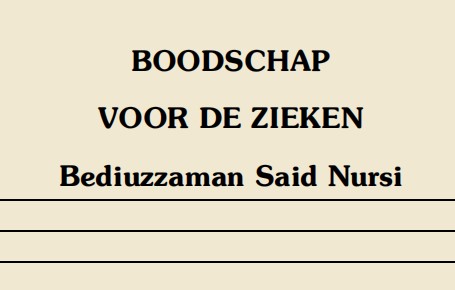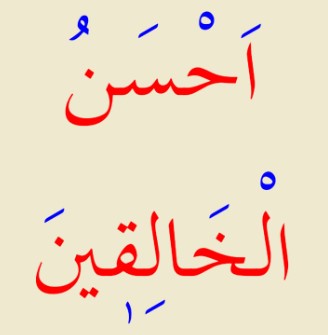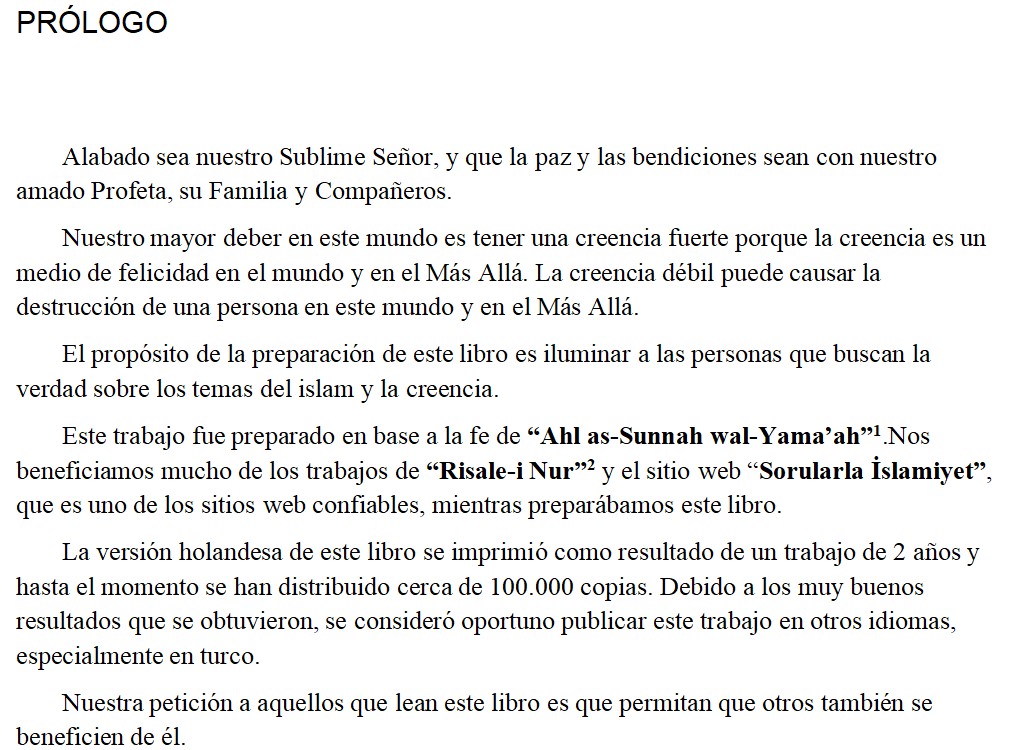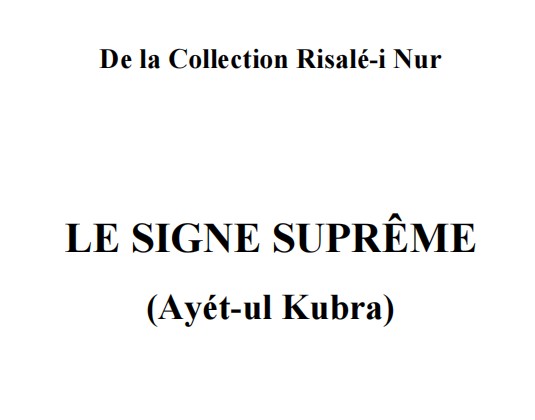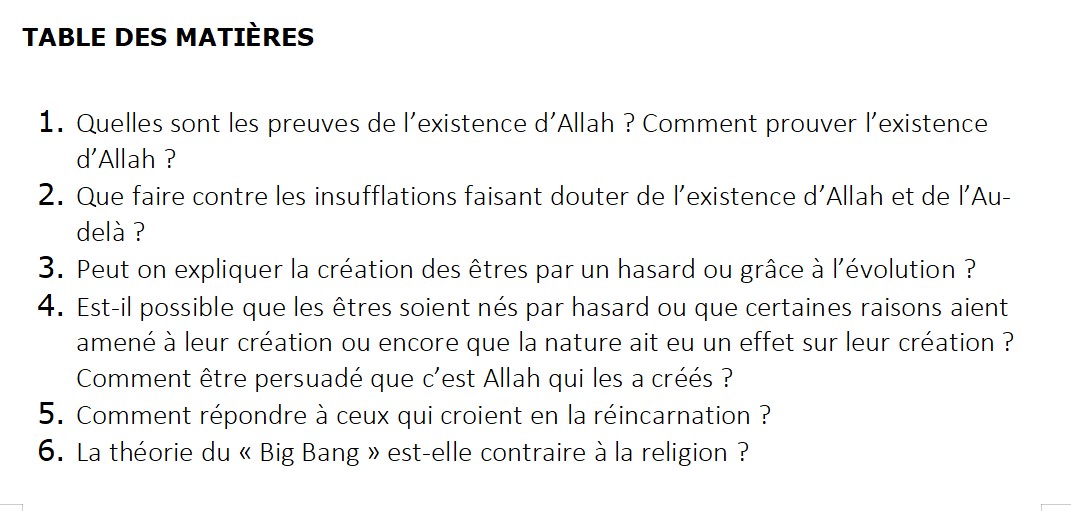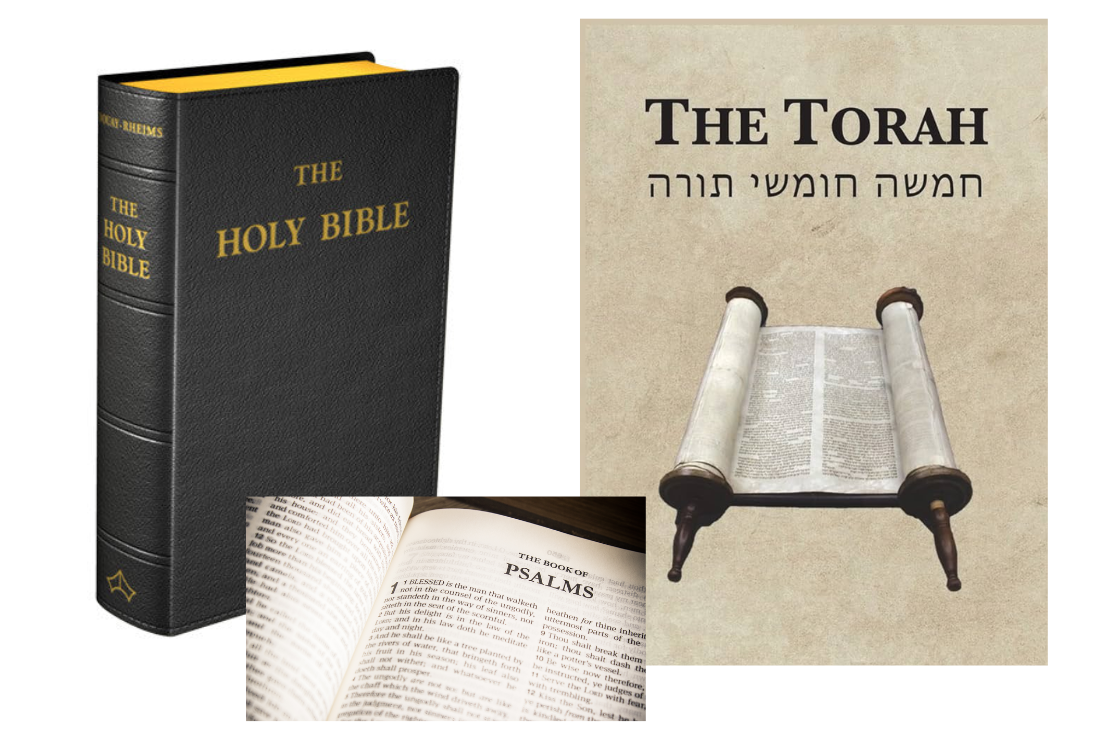
Torah & Bible Heralding Him!
THE TIDINGS OF MUHAMMAD’S (PBUH) PROPHETHOOD GIVEN BY THE TORAH, THE BIBLE, THE PSALMS OF DAVID, AND THE SCRIPTURES REVEALED TO OTHER PROPHETS
The distortions made by Christians and Jews in their books, especially their omission of the verses in which our Prophet (pbuh) was foretold, are described in the Qur'an as follows:
“So woe to those who distort the Scripture with their own hands then say, ‘This is from Allah’—seeking a fleeting gain! So woe to them for what their hands have written, and woe to them for what they have earned.”(1)
“O People of the Book! Now Our Messenger has come to you, revealing much of what you have hidden of the Scriptures and disregarding much. There certainly has come to you from Allah a light and a clear Book” (2)
The Holy Qur'an says that Christians have covered up a lot of information revealed in the Bible. Some of this information is the statements in the Bible that point to the future of the Prophet (PBUH).
The most detailed study on this subject belongs to Husain al-Jisri. This Syrian scholar, who lived between 1261-1327 AH and whose parents were Ahl al-Bayt, extracted one hundred and fourteen signs related to our Prophet (pbuh) from the holy books in question and published them in his “Risale-i Hamidiyya”, which was also translated into Turkish.
And in the19th Letter of Mektubat (The Letters) of the Risale-i Nur, in which the miracles of the Prophet Muhammad are described, there is a section in which the signs of the Prophet Muhammad in the previous Holy Books are mentioned. Here are some examples from that part:
“Since those Books are revealed scriptures and those who brought them were prophets, it is necessary and certain that they should have mentioned the one who would supersede their religions, change the shape of the universe, and illuminate half the earth with the light he brought. Is it possible that those scriptures, which foretold insignificant events, would not speak of the most important phenomenon of humanity, the prophethood of Muhammad (UWBP)? Yes, since they would certainly speak of it, they would either denounce it as a falsehood and so save their religions from destruction and their books from abrogation, or they would affirm it, and through that man of truth, save their religions from superstition and corruption. Now, both friend and foe agree that there is no sign of any such denouncement in the scriptures, in which case there must be affirmation. (The Letters, 198)”
“The words of the Torah, the Bible, and the Psalms do not have the miraculousness of those of the Qur’an. They have also been translated again and again, and a great many alien words have become intermingled with them. Also, the words of commentators and their false interpretations have been confused with their verses. In addition, the distortions of the ignorant and the hostile have been incorporated into them. In these ways, the corruptions and alterations have multiplied in those Books. In fact, Shaikh Rahmatullah al-Hindi, the well-known scholar, proved to Jewish and Christian scholars and priests thousands of corruptions in them, and silenced them. Nevertheless, despite these corruptions, in our times the celebrated Husain al-Jisri (May Allah have mercy on him) found one hundred and fourteen allusions to the prophethood of Muhammad (UWBP), and included them in his al-Risala al-Hamidiya. This was translated into Turkish by the late İsmail Hakkı of Manastır; whoever wishes may refer to it. (The Letters, 198)”
“Also, many Jewish and Christian scholars acknowledged and admitted that the attributes of Muhammad the Arabian (Upon whom be blessings and peace) were written in their scriptures. The famous Roman Emperor Heraclius, who was a non-Muslim himself, said: “Jesus foretold Muhammad’s coming.” (3)
Also, another Roman ruler called Muqawqis, the Governor of Egypt, and celebrated Jewish scholars and leaders such as Ibn Suriya, Zubayr b. Batiya, Ibn Akhtab and his brother Ka‘b b. Asad, although remaining non-Muslim, admitted: “He is described in our Books.” (4)
Also, some of the well-known Jewish scholars and Christian priests gave up their obduracy on seeing Muhammad’s (UWBP) attributes as described in the above-mentioned books, and believed in him. They then pointed out these references to other Jewish and Christian scholars, and convinced them. Among them were the famous ‘Abdullah b. Salam, Wahb b. Munabbih, Abu Yasir, the two sons of Sa‘ya, Asid and Tha‘laba, and Shamul. The latter lived at the time of Tubba‘, the ruler of Yemen.(5) Shamul became a believer before Muhammad’s prophetic mission and without ever seeing him, just as Tubba‘ did.(6) While the guest of the Bani Nadir before the prophetic mission, a gnostic called Ibn al-Hayyaban, declared: “A prophet will soon appear, and this is the place he will emigrate to.” He died there. Later, when that tribe was at war with Allah’s Messenger (Upon whom be blessings and peace), Asid and Tha‘laba came forward and cried out to the tribe: “By Allah, he is the one Ibn al-Hayyaban promised would come. Don’t fight him!” (7) But they did not heed him, and paid the penalty. (The Letters, 199)”
In the same passage Bediuzzaman also gives some examples from the Holy Books themselves. Here are some of them:
“A verse from the Gospels:
I ask from my Lord for the Paraclete that he may abide with you forever. (8)
Paraclete, meaning the distinguisher of good from evil, is the name of our Prophet (UWBP) in those Books.
A verse from the Torah says:
And God said unto Abraham, As for Sarai thy wife, thou shalt not call her name Sarai, but Sarah shall her name be. And I will bless her, and give thee a son also of her: yea, I will bless her, and she shall be a mother of nations; kings of people shall be of her. (9)
Another verse from the Torah:
I will raise them up a Prophet from among their brethren, like unto thee, and will put my words in his mouth;and he shall speak unto them all that I shall command him. (10) (The Letters, 202-203)
In several places in the Gospels, a prophet who will come after Jesus is referred to as "the Master of the World". Here are some samples for this:
“And now I have told you before it come to pass, that, when it is come to pass, ye might believe. Hereafter I will not talk much with you: for the prince of this world cometh, and hath nothing in me. (11)
“Nevertheless I tell you the truth; it is expedient for you that I go away: for if I go not away, the Comforter will not come unto you; but if I depart, I will send him unto you. And when he is come, he will reprove the world of sin, and of righteousness, and of judgement: Of sin, because they believe not on me; Of righteousness, because I go to my Lord, and ye see me no more;of judgement, because the prince of this world is judged.” (12)
Now see, who other than Muhammad the Arabian (Upon whom be blessings and peace) is the Ruler of the World and true consoler of men? Yes, the Glory of the World is he, and he is the one who will save transitory man from eternal extinction and thus comforts him. (The Letters, 206)
Who other than Muhammad the Arabian (Upon whom be blessings and peace) has turned the world’s wrongdoing into righteousness, saved men from sin and associating partners with Allah, and transformed politics and world rule?
Here “the Ruler of the World” is certainly Ahmad Muhammad (UWBP), for he is known as the Master of Humanity. (The Letters, 205-206)”
In the thirty-third chapter of the fifth book of the Torah, there is the following verse:
“And this is the blessing, wherewith Moses the man of God blessed the children of Israel before his death. And he said, The Lord came from Sinai, and rose up from Seir unto them; he shined forth from mount Paran, and he came with ten thousand of saints: from his right hand went a fiery law for them.” (13)
In this verse, with the phrase “the Lord came from Sinai,” the prophethood of Moses is mentioned; with the phrase “rose up unto us from Sa‘ir” (Sa‘ir being a mountain near Damascus), the prophethood of Jesus is indicated. And the phrase “He shined forth from Mount Paran” (the Paran Mountains being the mountains of Hijaz), gives tidings of the prophethood of Muhammad (UWBP), as all will agree. (The Letters, 204)
In the forty-second chapter of the Book of Isaiah, there are the following verses:
“Behold my servant, whom I uphold; mine elect, in whom my soul delighteth; I have put my spirit upon him: he shall bring forth judgment to the Gentiles.
He shall not cry, nor lift up, nor cause his voice to be heard in the street.
A bruised reed shall he not break, and the smoking flax shall he not quench: he shall bring forth judgment unto truth.
He shall not fail nor be discouraged, till he have set judgment in the earth: and the isles shall wait for his law. (14)
Here, the verses explicitly describe Muhammad (Upon whom be blessings and peace), the prophet of the end of time. (The Letters,204-205)
In the fourth chapter of the Book of Micah, are the following verses:
“But in the last days it shall come to pass, that the mountain of the house of the Lord shall be established in the top of the mountains, and it shall be exalted above the hills; and people shall flow unto it.
And many nations shall come, and say, Come, and let us go up to the mountain of the Lord, and to the house of the God of Jacob; and he will teach us of his ways, and we will walk in his paths: for the law shall go forth of Zion, and the word of the Lord from Jerusalem.” (15)
These verses obviously describe the most blessed mountain in the world, Mount ‘Arafat, and the worship and proclamations of “Allah is Most Great!” of those making the Hajj, who will flock there from all climes, and the Community of Muhammad, famous for the divine mercy it will receive. (The Letters, 205)
“He shall have dominion also from sea to sea, and from the river unto the ends of the earth.
The kings of Tarshish and of the isles shall bring presents: the kings of Sheba and Seba shall offer gifts.
Yea, all kings shall fall down before him: all nations shall serve him.
And he shall live, and to him shall be given of the gold of Sheba: prayer also shall be made for him continually; and daily shall he be praised.
His name shall endure for ever: his name shall be continued as long as the sun: and men shall be blessed in him: all nations shall call him blessed. (16)
These verses describe the Glory of the World, the Prophet Muhammad (UWBP) most evidently. Apart from Muhammad the Arabian, what prophet has come since David (Upon whom be peace) who has spread his religion from East to West, made kings pay tribute, and brought rulers to submission as though prostrating; to whom every day one fifth of mankind offer benedictions and prayers, and whose lights have irradiated from Medina? Has there been any other? (The Letters, 205)
Q u e s t i o n : Why is it that while the other prophets foretell the coming of Muhammad (UWBP), Jesus (UWP) does so more fully and in the form of good news?
T h e A n s w e r : Because Ahmad (Upon whom be blessings and peace) defended Jesus (Upon whom be peace) against the fearsome denials and slander of the Jews, and saved his religion from corruption. Furthermore, in the face of the burdensome Shari‘a of the Children of Israel, who did not recognize Jesus, he came with an elevated Shari‘a which was easy, all-encompassing, and completed the deficiencies of Jesus’ Shari‘a. For these reasons, Jesus often gave the good news: the Ruler of the World will come! (The Letters, 208-209)
This letter contains many more verses from the Torah, Bible, Psalms and other Holy Books. We recommend reading the relevant chapters. And Bediuzzaman concludes this topic with the following statements:
“Now it is clear that in the Torah, the Gospels, the Psalms of David, and in the scriptures of other prophets, there are numerous discussions of a prophet who is to come at a later time, many verses mentioning him. Just as we pointed out examples of these, showing that he is mentioned in these Books under various names. Who, other than Muhammad (Upon whom be blessings and peace), the Prophet of the end of time, could it be that these scriptures of the prophets speak of so repeatedly in their verses, and with such importance? (The Letters,209)”
Nur Way
(1) Qur’an, 2/79
(2) Qur’an, 5/15
(3) {Ibn Sayyid al-Nas, 'Uyun al-Athar ii, 26; Qadi Iyad, al-Shifa' i, 364.}
(4) {Suyuti, al-Khasa'is al-Kubra ii, 139; Qadi Iyad, al-Shifa' i, 366; 'Ali al-Qari, Sharh al-Shifa' i, 744-5; Ibn Kathir, al-Bidaya wa'l-Nihaya iv, 80, 81, 272; Bayhaqi, Dala'il al-Nubuwwa iii, 362; Waqidi, Kitab al-Maghazi 403-4; Abu Na'im, Dala'il al-Nubuwwa i, 85.}
(5) {Qadi Iyad, al-Shifa' i, 366; 'Ali al-Qari, Sharh al-Shifa' i, 744-5; Ibn Kathir, al-Bidaya wa'l-Nihaya iv, 80-1; Bayhaqi, Dala'il al-Nubuwwa iii, 361-2; Waqidi, al-Maghazi 405-4; Ibn Jawzi, Sifat al-Safwa iii, 361-2; Abu Na'im, Dala'il al-Nubuwwa i, 79; ii, 492.}
(6) {Bayhaqi, Dala'il al-Nubuwwa i, 367; ii, 526; vi, 240-9; al-Hindi, Kanz al-'Ummal xi, 401; xii, 390-408; Qadi Iyad, al-Shifa' i, 364; 'Ali al-Qari, Sharh al-Shifa' i, 739-43; al-Haythami, Majma' al-Zawa'id viii, 240.}
(7) {Bayhaqi, Dala'il al-Nubuwwa ii, 80-1; iv, 31; 'Ali al-Qari, Sharh al-Shifa' i, 744-5; Yusuf Nabhani, Hujjat Allah 'ala'l-'Alamin 137; Abu Na'im, Dala'il al-Nubuwwa i, 82; Ibn al-Jawzi, Sifat al-Safwa, i, 87.}
(8) New Tastement, John, 14/16
(9) Old Testament, Genesis, 17/15-16
(10) Old Testament, Deuteronomy, 18/18
(11) New Tastement, John, 14/ 29-30
(12) New Tastement, John, 16/ 7-11
(13) Old Testament, Deuteronomy, 33/ 1-2
(14) Old Testament, Isaiah, 42/ 1-4
(15) Old Testament, Micah, 4/ 1-2
(16) Old Testament, Psalms, 72/ 8,10,11,15,17

